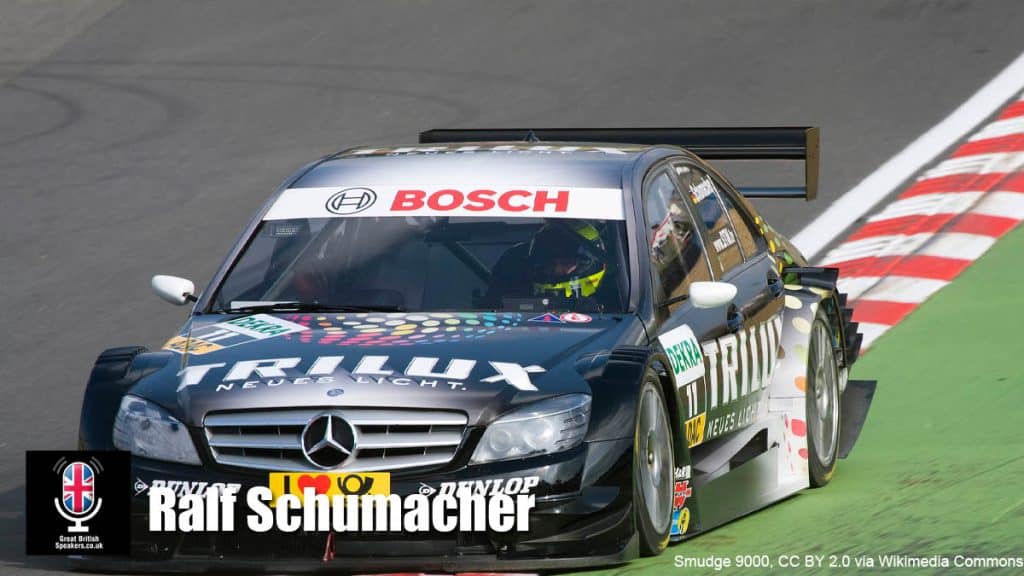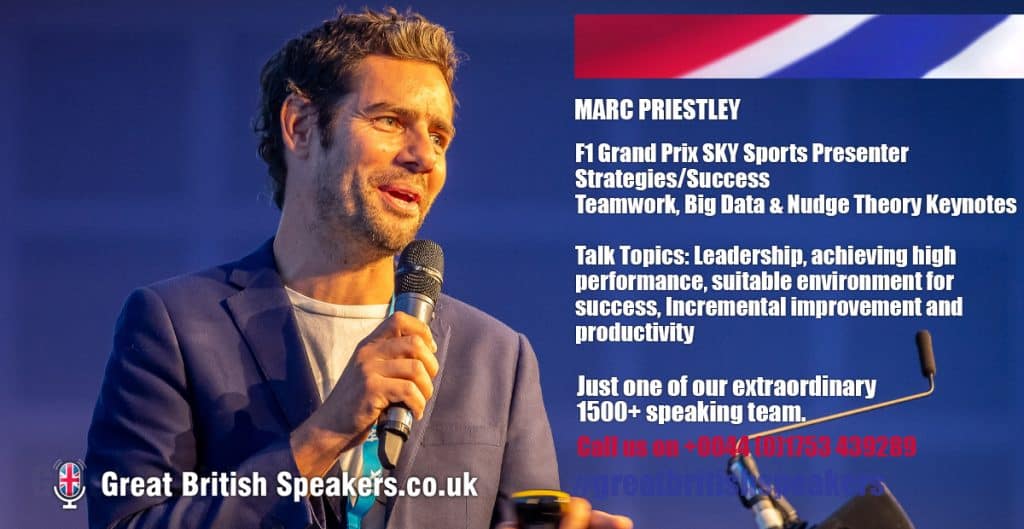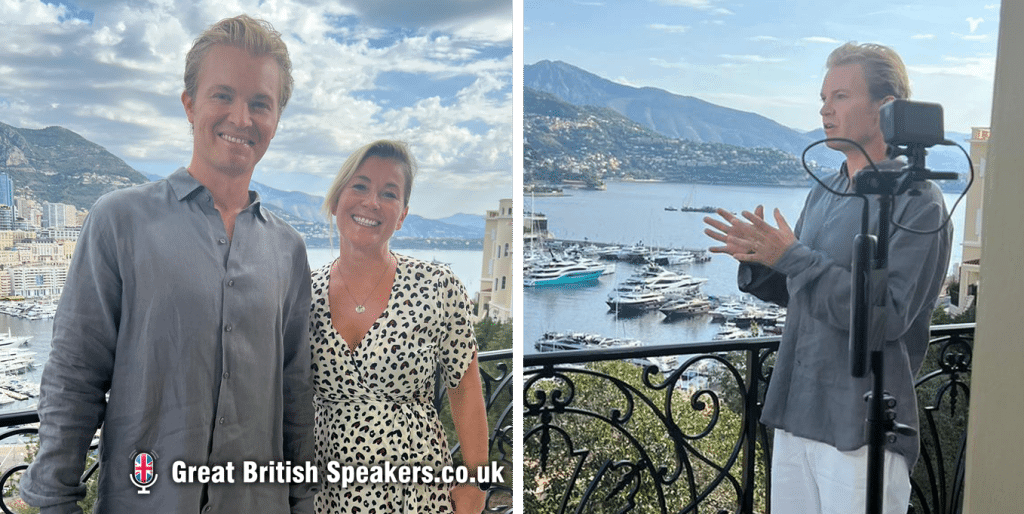Other Articles



At Great British Speakers, we have looked into how Formula 1 can inspire businesses. This blog explores how high-performance F1 speakers can provide key deliverable takeaways for an organisation and its staff.

The requirements of Formula One’s team leaders have significantly changed over the years as teams become larger and more complex and business models transform. Today’s leaders are responsible for leading teams of up to 1,800 employees, creating a high-performance organisation fully aligned behind a strategy aimed at achieving a set of well-defined and ambitious goals.
Competition is key in Formula One and in business, and competitive leaders help create a culture in which team personnel are responsible and happy to be held accountable for their own performance. Developing a high degree of psychological safety requires staff to speak up and speak out with strong cross-functional communication. A relentless focus on continuous improvement is part of the F1 leaders’ mindset, and teams take a data-driven approach to measuring performance, highlighting issues, and analysing developments.
However, whilst F1 is a technocentric sport, successful leaders recognise that the people, not the tech, make the difference. This is why so much effort is made to create an environment where employees thrive, using their combined talents to solve problems and create highly innovative solutions.
Formula One teams can consist of over 1,800 employees, less than 10% of whom actually attend the race events. Thus, teamwork requires alignment, shared purpose, and close collaboration across all levels of the business. Alignment behind the team’s strategies and ambitious goals is vital, as is the agility to flex strategy in the face of constant changes in technology and competitors’ performance.
The F1 world championship includes 24 Grand Prix, and these represent a series of non-negotiable deadlines that the entire organisation must meet regarding car development and hardware and software upgrades. The ultimate example of high-performance teamwork comes from the mandatory pit stops; the record now stands at 1.8 seconds, during which 22 staff carry out 36 tasks in a pressured environment.
More than any other sport, F1 has embraced a data-driven business culture, focusing on marginal gains and continuous improvement. The teams use data to enable drivers, engineers, and HQ staff to determine precisely how the car and driver behave, diagnose issues, resolve problems, and speed up decision-making. As information flows seamlessly around the globe, linking cars, teams, and factories, tech security is essential and robust systems ensure protection from threats.
The use of simulators has transformed driver training, enabling systems to be learned, tested and developed in a virtual environment prior to real-world deployment. And with the advent of additive manufacturing, machine learning and AI across F1, the sport’s use of technology to innovate and transform all aspects of its operations is set to accelerate further.

It goes without saying that F1 is a dangerous sport, but safety is a first-order priority, and the last 25 years have seen a profound change in how the sport manages risk. Between 1950 and 1994, there were over 40 driver fatalities at races; there has just been one since. This has been made possible by creating clear priorities regarding safety. Safety is not an area of competitive advantage; safety systems, processes, and technologies are shared so that F1 doesn’t have islands of excellence in oceans of mediocrity.
However, the risk-averse teams never win… the teams that embrace and manage risk are more likely to try new things, innovate in small and large ways, and ultimately drive competitive advantage. It’s the difference between participating and competing. The other factor is ‘fear of failure’. Teams that have a blame culture create such a degree of fear that everyone minimises their contribution and hides their mistakes, whereas those which thrive on creating a learning environment of continuous improvement have a degree of openness, honesty and transparency, which promotes creativity and innovation, and taking risks, in a controlled way.
F1 motor racing has placed safety at the centre of its regulatory, technical, and operational focus for over 25 years, but the cultural shift among these high-performing teams of men and women competing at the forefront of the world championship has had the greatest impact on the sport’s safety revolution.
Given the importance of human factors and behaviours in managing risk, ensuring safety and guaranteeing positive outcomes, F1 has also broadened the scope of its safety programmes to include team members’ health, wellbeing and psychological safety, giving everyone a voice. F1 teams recognise that mental health, physical fitness and overall wellness are key to achieving and sustaining the best outcomes.
Every industry is witnessing change, and F1 is no different. One of the challenges facing F1 teams is that the sector is ever-changing – so change management and leading teams through periods of transformation is an essential part of the job. Change comes in many forms: technology, compliance, competition, customer demands, and environmental and social issues. F1 has had to reinvent its business model, embrace digitalisation, and adapt to a changing media and social landscape. Above all, F1’s leadership teams have had to communicate, manage, and implement transformation strategies, bringing their teams with them and ensuring they make the most of embracing change.
F1 is often seen as a potentially wasteful, gas-guzzling sport with a large carbon footprint that is damaging to the environment. Yet the sport is in the midst of a revolution, one that will see the World Championship, all ten teams, 24 Grands Prix, and every facet of its operations achieve Net Zero Carbon by 2030.
In 2026, the sport will stop using fossil fuels, working with the energy sector to develop sustainable, synthetic fuels and sophisticated hybrid technologies. Factory operations, event operations, technology, travel, and logistics—every area of activity—are being addressed to ensure the sport is fully sustainable, developing solutions that have wider applications to society.

Marc began his petrolhead career in motor racing and was ultimately in the McLaren Racing F1 team as #1 mechanic and pit lane manager, working alongside driving legends such as Jenson Button, Fernando Alonso, and Lewis Hamilton. He is now the host of the Discovery Channel’s Driving Wild: Gears, Grease, and Glory and is the co-host of The F1 Report on Sky Sports. As a speaker, he talks you through the F1 ethos of accountability, communication, personal and team development, responsibility, and accepting changes.

Claire Williams OBE is a British former motorsport executive who led the Williams F1 racing team. She is one of only a handful of women to have ever led an F1 team. Under her leadership, Williams finished 3rd in the World Championship for Constructors in 2014 and 2015.
Today, Claire is a global brand ambassador for WAE Technologies, formerly known as Williams Advanced Engineering. WAE Technologies is involved in decarbonising heavy transport through the development of advanced, green, and sustainable technologies.

Mika Hakkinen scored back-to-back titles in 1998 and 1999 as lead driver for the all-conquering McLaren-Mercedes Benz team, achieving unprecedented success in a career almost ended by a serious accident at the Australian Grand Prix in 1995. With 20 Formula 1 race victories and 51 top-three podium finishes to his name, he ranks among the most successful drivers of all time.
Today, Mika is a globally sought-after keynote speaker who inspires audiences with real-world lessons gained from his Formula One career.

Guenther Steiner is a celebrated motor racing engineer, team principal, and author. Fluent in three languages, Guenther progressed from engineer to team principal within F1 over an impressive 37-year career.
Since then, he has appeared in several F1 programmes, including Netflix’s Drive to Survive, and published related nonfiction books. He is now a popular keynote speaker and is invited to speak all over the world. Tailoring his talks to the needs of the organisation, Guenther is guaranteed to both inspire and entertain.

Dr Cristiana Pace is a leader and innovator in motorsport, focusing on sustainability and change management strategies. Over a 20-year career, Cristiana became the first woman to work alongside the FIA technical department in F1, made key contributions to their safety legacy, and worked with WAE to advance motorsport technology.
Voted one of the Top 50 Women In Engineering in 2021, Cristiana is a Chartered Engineer and a Fellow of the Women in Engineering Society. She is now an inspirational keynote speaker, covering topics from STEM to diversity, sustainability, technology, and Formula One.
On a previous project, Great British Speakers Managing Director Jane Farnham met up with F1 driver Nico Rosberg in Monaco to discuss how F1-based technology can help provide us with a sustainable future.



